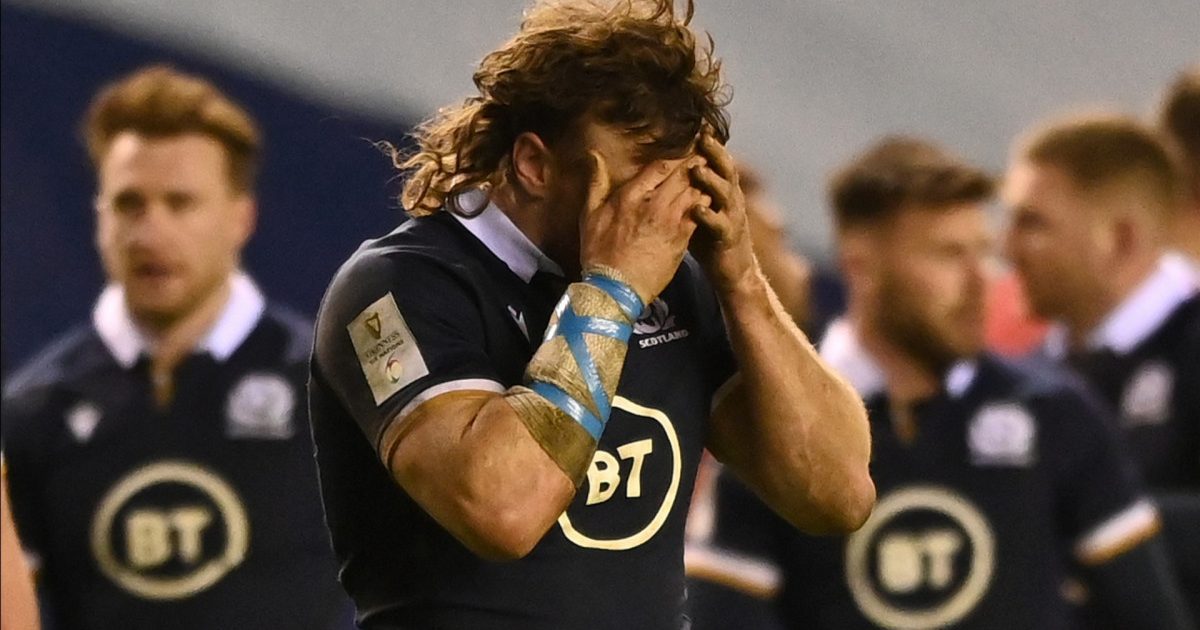'What I was meaning...': Hamish Watson has again revisited his comments about Zander Fagerson's Six Nations red card

Guinness Six Nations player of the tournament Hamish Watson has revisited the round two red card suffered by fellow Scotland forward Zander Fagerson and reiterated how his initial comments in the wake of the prop’s Murrayfield sending off were wrong. Watson said in the immediate aftermath of the narrow February 13 loss to Wales: “That was a rubbish call. An absolutely dreadful call. That’s not rugby, that call.”
The back row soon recanted, tweeting: “Poor comments from me, emotions were very high after losing a very tight match. Players’ health is paramount.” The 29-year-old Watson, who is tipped next month for Lions tour selection, has now revisited the Scotland controversy in the company of The Rugby Pod, going back over his view of the red-carded Fagerson tackle on Wyn Jones that received a four-match ban.
“It’s so tough,” he told co-hosts Andy Goode and Jim Hamilton about the recent clampdown by referees. “Especially after that Wales incident, you saw in the weeks after that it was red card after red card and it is so hard.
“After I had cooled off after the things I had said and I looked at it, obviously by the letter of the law it is a red card. Player safety is the main thing and Wyn Jones could have been hurt, so I understand what I said was wrong and I didn’t put it across in the best way.
“But what I was meaning, I just think almost every other ruck you could give a yellow card and that is the problem at the moment with rugby. Yes, by the letter of the law, that is 100 per cent a red card and the other ones we have seen are probably red cards but sometimes there needs to be a bit of room there.
Player of the @SixNationsRugby and the finest mullet in rugby, Scotland's @hamishwatson7 joins us on the Pod this week🏴
Listen 👉 https://t.co/rDLwYyPvlp pic.twitter.com/ggA7JUBzgb
— The Rugby Pod (@TheRugbyPod) April 13, 2021
“It’s so tough because it is all about the concussions and the stories you hear at the moment going around with some ex-rugby players, you have got to look after the players. It is a red card but it is a hard one because we all know that stuff goes on quite a lot.”
Co-host Hamilton recalled that during his time playing for Scotland that the call in the defensive line was “kill” and he wanted to know if the terminology currently used in the game at Test level by Watson and co was just as drastic or had it been diluted due to increased safety concerns.
“The problem with it is it’s such a physical sport and if you almost don’t go in with your physicality right, everyone would have had those days where you are not physically at that point that you need to be at to play a game of rugby, and that is when you tend to get hurt if you are not switched on,” continued Watson, who has won 46 Scotland caps since a 2015 debut.
“The coaches and staff probably try and get away from using words like that but you still need to almost go in with that attitude. It is a physical sport, what you are doing can hurt people, even when you do it in the cleanest ways. It is a tough one. If you don’t go in with the right attitude you are going to get hurt as well, so it is just trying to keep it as clean as possible.
“Now there is a lot more coaching, especially towards the back end of the season, and they are saying watch out for this, watch out for even doing a hold-up, if you get someone around the neck then it is going to be a card, so the coaches are trying to bring it – but you are doing everything at such a quick tempo that stuff does go wrong because if you are not fully committed then you are going to end up hurting yourself.
“I don’t think any player goes in thinking, the ones where they haven’t wrapped an arm and they end up hitting them in the head, no player is deliberately doing that,” he said, adding that the differences in the coaching of tackles between club and international set-ups can add to the difficulty in getting it right.
“It’s really hard. I remember I used to be a low chop tackler and then when Alan Solomons and Omar (Mouneimne) came in our defence system was all about tackling high and you all had to tackle high and hold up and slow the ball down by going high. To change your attitudes is quite hard.
“Players with their club team who maybe choke and tackle high to slow the ball down instead of jackaling then go back to their international set-ups and give away a few penalties for getting their body shapes wrong or going too high, it is tough to change in an eight-week camp. That is really tough.”
There is no English representation on the Lions coaching team chosen by Gatlandhttps://t.co/01jJk0rfEm
— RugbyPass (@RugbyPass) April 13, 2021





























